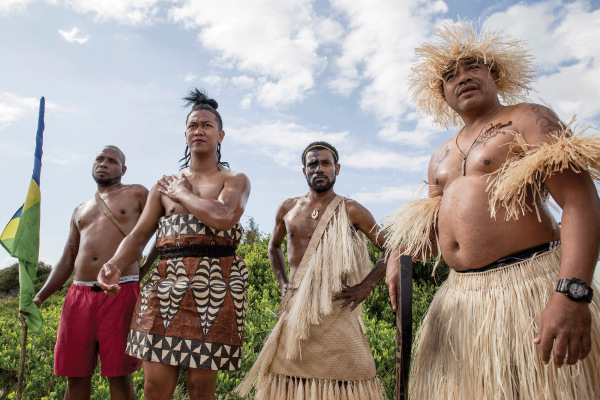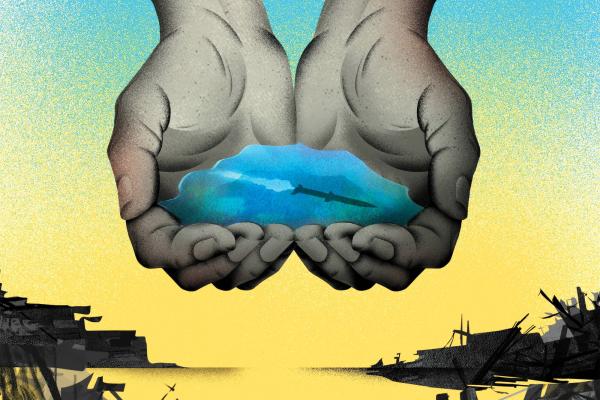IN MARCH, CIVIL society groups across the Pacific — including churches — unveiled a landmark declaration to end fossil fuel expansion in the Pacific region. The Naiuli Declaration provides a moral rudder from Pacific communities to guide the international Fossil Fuel Non-Proliferation Treaty.
Pacific Islanders are championing the treaty as a legally binding mechanism to end new exploration and to support the rapid, equitable, and lasting phaseout of fossil fuels, core drivers of climate change and sea-level rise. To date, 12 nations have endorsed the treaty, including fossil fuel-producing countries Timor-Leste and Colombia. In the U.S., Maine, California, and Hawaii have also endorsed the treaty.
In envisioning our fossil free future, the Naiuli Declaration carries the twin aspects of vulnerability and resilience (the term Na i Uli draws from indigenous Fijian words for the steering oar in traditional double-hulled ocean canoes). There is the vulnerability of communities facing an existential crisis caused by climate change, putting at risk livelihoods, culture, our deep spiritual relationship with land and ocean, and the possibility for climate-induced displacement. The sense of exile evoked by this vulnerability resonates with the psalmist, who laments: “For there our captors asked of us songs, and our tormentors asked for mirth, saying, ‘Sing us one of the songs of Zion!’ How could we sing the Lord’s song in a foreign land?” (Psalm 137:3-4).
For many Pacific island churches, climate financing proposed by the highest polluter nations is akin to the biblical 30 pieces of silver — blood money offered in exchange for the betrayal of Pacific Islanders who are demanding a phaseout of fossil fuels. Last fall, the Pacific Conference of Churches, representing 19 Pacific island nations and territories, urged leaders at the COP28 U.N. Climate Change Conference to “hear the cry of our people, land, and ocean and to remember that without maintaining the 1.5 degree target, all climate adaptation and loss and damage funding is blood money.”
Our Pacific people are resilient. We are rooted in our traditional Indigenous wisdom, our practice of living in harmony with creation, and our Christian faith, which provides us with a prophetic voice to counter the greenwashing from the fossil fuel industry. Amid unsustainable development and a global culture of mining and extraction, our communities continue to live out Paul’s words: “Do not be conformed to this age, but be transformed by the renewing of the mind, so that you may discern what is the will of God” (Romans 12:2). Our churches struggle for survival, but we must also articulate a vision of an abundant Pacific that flourishes because of climate justice. This is why so many have endorsed the fossil fuel treaty and the Naiuli Declaration.
As Pacific climate warrior Suluafi Brianna Fruean said, “A fossil fuel-free Pacific is not only a dream for the future, but a memory of our past.” The prophetic narrative in the Naiuli Declaration rescues many Pacific stories that have been stolen, greenwashed, and used to promote false climate “solutions” (such as the proposal to replace surface extraction of fossil fuels with rapacious deep-sea mining). The declaration’s call for a “just and equitable transition” targets important economic issues for the Pacific, such as reforming existing financial institutions and providing transition finance “without furthering debt and aid dependency for the Pacific.”
Our communities are promoting conversion to low-carbon transportation systems for this huge maritime region. The estimated cost of replacing all existing fossil fuel electricity generation in eight Pacific island countries is around $1 billion. This is less than 14 percent of the amount of money that Australia gave to the fossil fuel industry in subsidies in 2022 and 2023, according to “Ki Mua,” a report issued last year by the Fossil Fuel Non-Proliferation Treaty Initiative. It’s less than half a percent of the profit made by the top five fossil fuel companies in 2023.
We have global and legal frameworks for a just transition, but we have not had a moral framework to bring together the aspirations of the Pacific people. The Naiuli Declaration is a manifesto, a vision, and an agenda for a fossil fuel-free Pacific. As we imagine our future together, we claim the Fossil Fuel Non-Proliferation Treaty as the way forward. It is a sacred covenant for governments, communities, and all creation.

Got something to say about what you're reading? We value your feedback!







